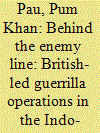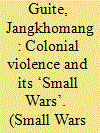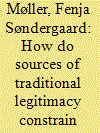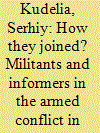|
|
|
Sort Order |
|
|
|
Items / Page
|
|
|
|
|
|
|
| Srl | Item |
| 1 |
ID:
165194


|
|
|
|
|
| Summary/Abstract |
The paper probes the formation of local Levies among the indigenous hill people of the Indo-Burma frontier and their contributions to the British-led guerrilla operations during the Second World War. With the shift of the theatre of the Southeast Asian edition of the Second World War from the Lower Burma plains to the mountainous hilly terrain in the Indo-Burma frontier, the mode of warfare also changed. In the new terrain where conventional warfare was no longer suitable the British Indian Army resorted to guerrilla tactics largely with the support of the indigenous hill people who had the traditional expertise in guerrilla fighting. However, the valour and heroism of the indigenous hill people behind the enemy lines has not received adequate scholarly attention. This paper discusses the case of three ethnic communities in the Indo-Burma frontier – Kachin, Naga and Zo (Kuki-Chin) – who were considered by the British as ‘loyal allies’ at the risk of Japanese atrocities. Supervised by British civil and military officers the local Levies not only effectively bogged down the Japanese forces in the frontier but also supplied valuable intelligence to the Allied force in the reconquest of Burma. The paper argues that Kachin, Zo and Naga rallied behind their colonial masters with the hope that they would receive reward from the latter after the war.
|
|
|
|
|
|
|
|
|
|
|
|
|
|
|
|
| 2 |
ID:
165199


|
|
|
|
|
| Summary/Abstract |
This paper concerns the lesser known British counterinsurgency (COIN) operations in Northeast frontier of India during the First World War. Officially known as the ‘Kuki Operations’, it was considered as part of the Great War. Carried out in isolation from press and public, and shelved in colonial archives, the event remained invisible until today. Yet, it registers a critical case of colonial COIN doctrine where the ‘moral effect’ doctrine was employed without being questioned. It unleashed enormous amount of organized violence, ranging from shoot at sight to indiscriminate burning of villages, wholesale destruction of property and livestock, prevention of cultivation and rebuilding of villages, forced mass displacement in jungles or in ‘concentration camps’, and collective punishment (communal penal labour and payment of compensation) after the war. This paper argues that the theory of ‘minimum force’ and the practicability of the ‘moral effect’ doctrine as applied by the Empire, sit oddly with each other at the frontier, where violence was seen both as a natural and moral orders. Violence as an ‘imperatively necessary’ method to bring order in a disorderly frontier, in the opinion of colonial state, informs and registers Northeast India as geography of violence.
|
|
|
|
|
|
|
|
|
|
|
|
|
|
|
|
| 3 |
ID:
165197


|
|
|
|
|
| Summary/Abstract |
Research concerning authoritarian stability and peace usually investigates co-optation and repression. Recently, several studies argue that traditional legitimacy is also important for stability in monarchies. However, existing research rarely considers how legitimacy constrains rebellions and help the royal family to stay in power. Hence, this article explores the causal links between sources of traditional legitimacy and absence of uprisings. The study investigates the relationship with a case study of the Kingdom of Swaziland. In line with my expectations, I find a causal relationship between sources of traditional legitimacy and absence of popular uprisings. First, the royal family actively uses traditional legitimacy to justify their rule. Second, the Afrobarometer indicates that the Swazi people trust the King more than citizens in other African countries trust their head of state. Third, opposition actors have limited opportunities to mobilize the broader population against the monarchy. Fourth, traditional legitimacy dampens ongoing protests and thereby hinders their escalation into popular uprisings or political violence. Repression is clearly an important explanation for limited rebellion in Swaziland, but this article shows that also traditional legitimacy sources play a role
|
|
|
|
|
|
|
|
|
|
|
|
|
|
|
|
| 4 |
ID:
165193


|
|
|
|
|
| Summary/Abstract |
The effectiveness of recruitment strategies is crucial for sustainability of any insurgent campaign. This paper identifies eight mechanisms used to encourage overt and covert participation in the armed conflict in Donbas and shows that they varied depending on the type of service expected from a recruit. It relies on the original dataset compiled from studying 798 court cases of insurgents and informers convicted in Ukrainian courts in the period from October 2014 to March 2017. The paper finds that militants were more responsive to contractual or hierarchical mechanisms of recruitment, while informers who provided cover support were more likely to join through ideological appeals or activation of prior social ties.
|
|
|
|
|
|
|
|
|
|
|
|
|
|
|
|
| 5 |
ID:
165195


|
|
|
|
|
| Summary/Abstract |
This article discusses the Rhodesian Front regime propaganda warfare strategy during Zimbabwe’s war of liberation. It uses the case of the Chilonga area of Chiredzi located in the south-east of Zimbabwe to demonstrate that propaganda warfare was introduced as a measure to counter guerrilla infiltration and civilian cooperation with them. Drawing on ideas of military anthropology vis-à-vis the importance of cultural awareness in counterinsurgency, the paper argues that the efforts of the Rhodesian Front regime to use propaganda were fruitless. This is because they mostly ignored the culture of the Shangani, local people. Despite that, there were other reasons for the failure of the Rhodesian Front’s propaganda strategy, including the lack of conformity between politics and military action.
|
|
|
|
|
|
|
|
|
|
|
|
|
|
|
|
| 6 |
ID:
165192


|
|
|
|
|
| Summary/Abstract |
In 2014, an affiliate of the Islamic State of Iraq and Syria emerged in Afghanistan. Wilayat Khorasan, or ISIS-K, intends to secure Afghanistan to legitimize the Islamic State’s caliphate across the ‘Khorasan Province’ including portions of Central Asia, China, Iran, the Indian Subcontinent, and Southeast Asia. While the group’s intent is clear, its capability confounds analysts. The authors argue that Wilayat Khorasan is likely the Islamic State’s most viable and lethal regional affiliate based on an expansionist military strategy. This is designed to enable the group’s encirclement of Jalalabad City in Nangarhar Province and is foundational to its expanded operational reach, regionalization, and lethality. Since 2016, the US-led Coalition’s counter-terrorism strategy has disrupted ISIS-K’s critical requirements and prevented external attacks. Yet, raids and strikes alone will not defeat ISIS-K. They must be calibrated against an institution-building approach that legitimizes Afghanistan’s government and redresses grievances that ISIS-K exploits to resolve.
|
|
|
|
|
|
|
|
|
|
|
|
|
|
|
|
| 7 |
ID:
165198


|
|
|
|
|
| Summary/Abstract |
Recent historical research exposed the myth of self-restraint as the distinctive feature of British counterinsurgency during decolonisation. This article shows that the revisionist historiography of British counterinsurgency has important, but unnoticed, implications for political scientists. Specifically, historical scholarship challenges the predictions and causal mechanisms of the main social scientific theses of civilian victimisation in counterinsurgency. Using revisionist historians’ works as a source of data, I test those theses against Britain’s decolonisation conflicts. I find that they do not pass the test convincingly. I conclude that political scientists should be more willing to explore the theoretical implications of new historical evidence on counterinsurgency campaigns.
|
|
|
|
|
|
|
|
|
|
|
|
|
|
|
|
| 8 |
ID:
165196


|
|
|
|
|
| Summary/Abstract |
This article analyses the Zimbabwe People’s Revolutionary Army operations in Mashonaland West province with particular reference to Makonde District during the country’s war of liberation. Despite the growing literature on ZAPU and ZPRA in Zimbabwe’s war of liberation there is little that has been written concerning the operations of ZPRA guerrillas in Mashonaland provinces. Guided by evidence drawn from secondary and primary sources the article further asserts that ZPRA adopted a four pronged strategy in Makonde District. This strategy in part was hinged on the politicization of the population on the one hand and annihilation of the enemy forces, attrition and manoeuvre warfare on the other. Again, the article argues that ZPRA guerrillas attempted to capture Salisbury (Harare) in order to conquer the Rhodesian Security Forces’ center of gravity. It was hoped that the capture of the capital city would be carried out from Makonde District because of its strategic significance to the conduct of ZPRA operations and arguably their manoeuvres hastened Ian Smith’s decision to attend the Lancaster House Conference negotiations that led to the independence of Zimbabwe in 1980.
|
|
|
|
|
|
|
|
|
|
|
|
|
|
|
|
|
|
|
|
|